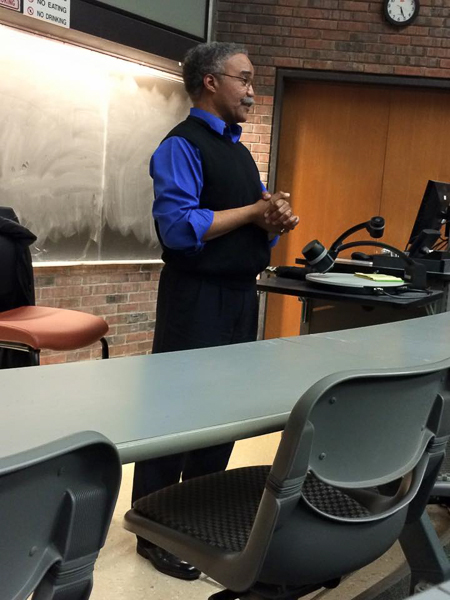
Social stereotypes may say that women are the ones who spend late nights crying and soothing their woes with ice cream after a breakup, but psychological research says otherwise.
On Monday, April 20 in the Lecture Center, the Evolutionary Studies Program hosted Joel Wade of the department of psychology at Bucknell University. Wade gave a talk entitled, “The Evolutionary Psychology of Breaking Up and Making Up,” which focused on the evolutionary theory of breaking up and making up as well as how emotional commitment, emotional access and sexual access affect reconciliation decisions during relationships.
According to Wade, 90 percent of relationships are ended by women, and it is men who suffer more once relationships are over.
During six years of research, he discovered that men are three times more likely to commit suicide after a breakup than women. Wade said that men and women have different coping methods, while men deal with their heartache on their own time and often turn to alcohol or drugs to numb the pain.
“Women seek more social support, whether it be through therapy or venting to friends,” Wade said. “There’s a cultural taboo against doing that for men, so they turn to more non-effective coping strategies.”
Though men tend to only be 10 percent of relationship terminators, Wade’s research found that breakups are not biased toward the pain that both parties feel once a relationship has ended.
“Brain scans find that breakups are as painful as getting a punch in the face from someone very strong,” he said. “It’s no wonder people are hurting afterward.”
Wade also found that the two main causes for breakups were emotional turmoil – not sharing one’s feelings with their respective partner – and sexual turmoil – a difference in the desired frequency of sex in the relationship.
Considering these two main factors, Wade also found that men generally choose mates based on fertility, reproductive potential and sexual access, while women tend to focus on a strong future, parental potential and emotional access.
Though emotional access tends to be a more common factor among women, this is not always the case. According to Wade’s studies, people who have previously been in sexual relationships are more likely to end a relationship based on a lack of emotional access. Wade found this to be the most common cause of breakups.
Tying into the main factors of breaking up, Wade also studied fighting and violence among couples. He found that young, insecurely attached men as well as men who are more accepting of violence toward women tend to be the more violent partner in the relationship.
Wade said that often times, fighting and violence in a relationship are caused by sexual jealousy and proprietorial tendencies as well as the fear of losing one’s mate.
During the lecture, Wade also delved into the most common actions for both sexes when making up after a breakup.
When reconciling with women, men tend to use emotional and commitment related tactics such as giving gifts and other nice gestures. Women tend to take a more sexual route when reconciling with men, but also tend to give gifts, apologize, be more affectionate and communicate more with their partner.
Contrary to societal belief, Wade also found that men say “I love you” a good six months before women do in relationships. He found that women are happier when men say “I love you” after having sex for the first time, while men are happier when women say “I love you” before.
Wade said he has always had an interest in attraction and mate preferences. He originally started researching self-esteem and attractiveness and from there had the desire to learn what it was about attractiveness that made it so important.
“People think that mate preference and attractiveness are socially conditioned, but biology plays a strong role,” Wade said. “We look for long term possibilities and tend to find people who are most reproductively fit most appealing.”
Glenn Geher, the director of evolutionary studies and a professor of psychology at SUNY New Paltz, said he felt breaking up and making up was a great topic to be discussed among a college age crowd.
“The issue of mating is central for college students,” Geher said. “Dr. Wade talked about things that young adults think about quite a bit. Relationships going up and down as well as thoughts of both short and long term relationships are highly relevant.”
Nicole Wedberg, assistant of the evolutionary studies program and a graduate student of psychology at New Paltz, agreed with Geher and said that she thought the topic was good for people of any age.
“It’s an important topic,” she said. “Evolutionary theory provides a simple explanation for phenomena and gives insight into our own being. It always makes sense, and it isn’t ridiculously abstract.”
